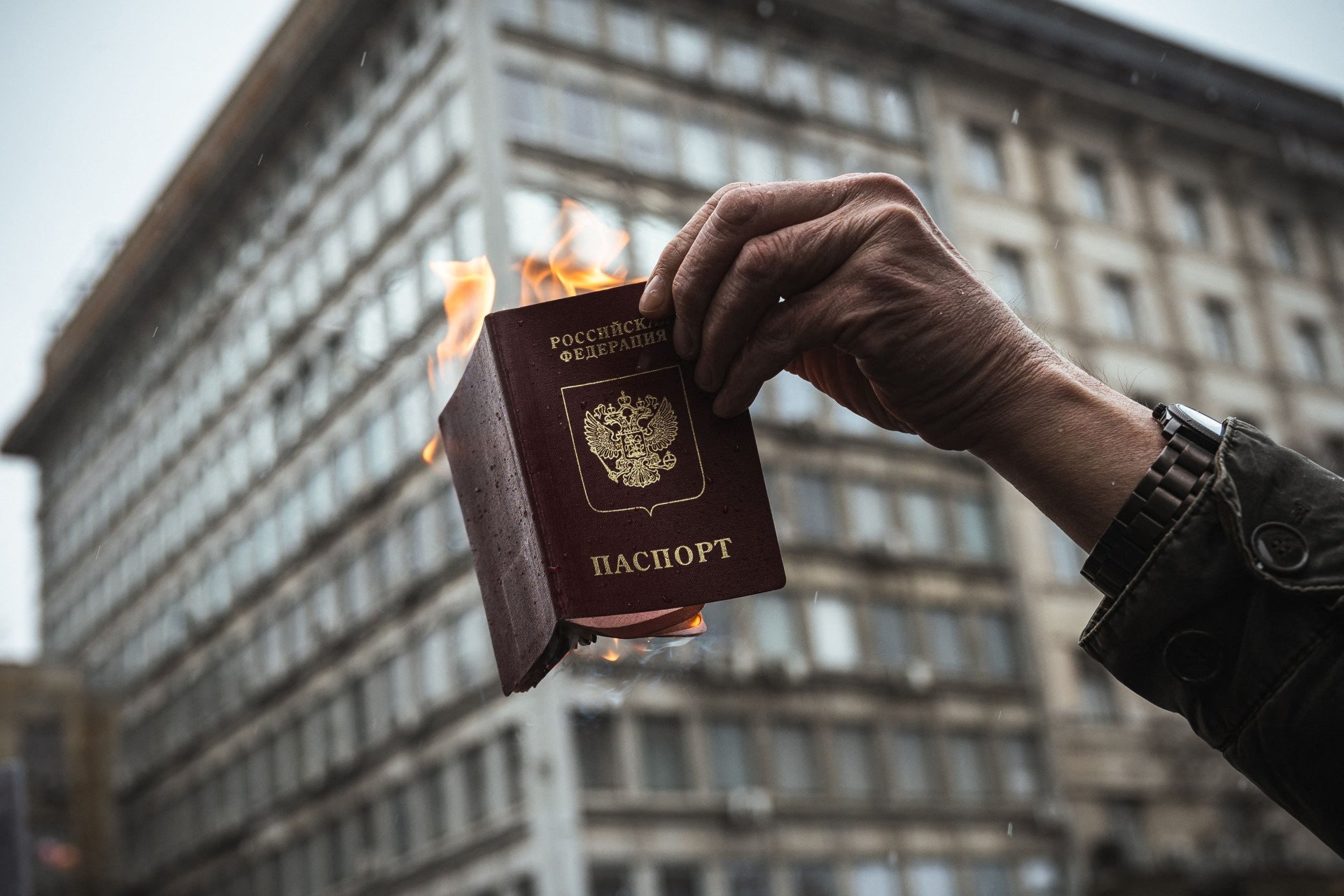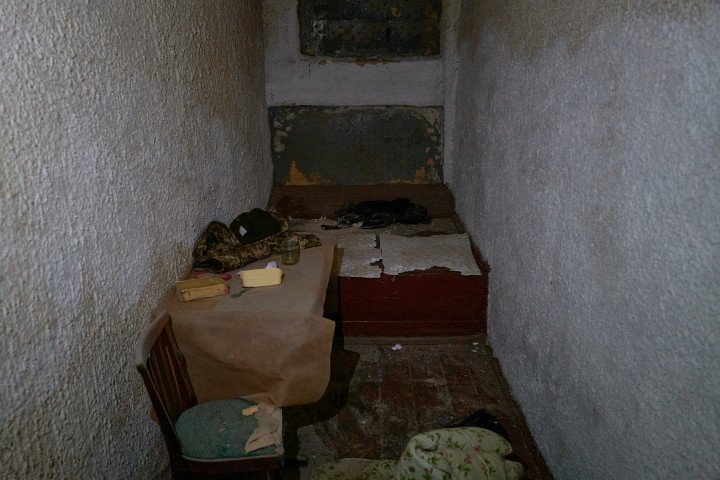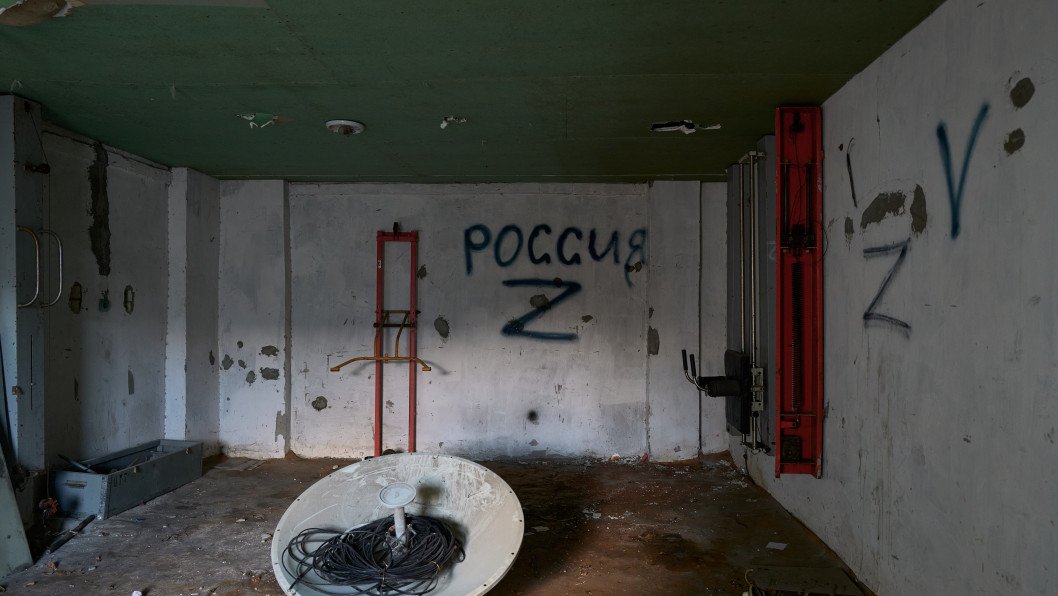- Category
- War in Ukraine
How Russia Forces Ukrainians Under Occupation to Fight Against Their Own Country

Russia is using torture and coercion to forcibly enlist Ukrainian civilians from occupied territory into the Russian army and fight against their own country. Eradicating Ukrainian identity is a systematic, violent, and planned process by Russian forces to use the lives of Ukrainians, instead of their own.
Earlier this year, Putin signed a decree planning to call up 133,000 people for military service. The Kremlin's latest mobilization efforts, in what’s been referred to as the "autumn draft" began in October 2024 and will continue until the end of the year.
Russian puppet authorities in Ukrainian regions such as Donetsk, Luhansk, Zaporizhzhia, and Kherson are forcing the conscription of Ukrainian civilians to Russia’s armed forces.
The Geneva Conventions, which addresses the protection of civilians during an armed conflict, states that the “occupying power”, in this case, Russia, can not force civilians to serve in its army. It also prohibits the occupying power from using “pressure or propaganda aimed at securing voluntary enlistment”.
Ukraine’s Foreign Affairs Ministry urges Ukrainians being forcefully conscripted into the Russian army to use the "I Want to Live" project and voluntarily surrender to the Ukrainian Armed Forces.
“Less visible is their practice of pressuring Ukrainian civilians in detention, who have nowhere to hide or flee, to join the Russian forces,” said Hugh Williamson, Europe and Central Asia director at Human Rights Watch.
Of 300,000 men mobilized in the Autumn of 2022, 80,000 were Ukrainians from the occupied Donetsk and Luhansk regions, according to a report by the Russian Defence Ministry.
⚡️ Russia forcibly drafts Ukrainian men from temporarily occupied territories into the Russian army.
— UNITED24 Media (@United24media) November 20, 2024
Russian state channel showed draft ceremonies for men from Crimea, Zaporizhzhia, Kherson, Donetsk, and Luhansk regions held in Russia's Rostov region and occupied Crimea. pic.twitter.com/kkCszT9JeJ
How does the Kremlin pressure Ukrainians to fight for Russia?
Imprisoned to tortured: Russia’s systematic abuse in occupied Ukraine
In Russian-occupied territories, there are more than 100 prisons, detention facilities, informal camps, and basements holding about 22,000 Ukrainians, roughly 8,000 of them prisoners of war and the rest civilians according to sources.
Detention facilities are known to be in appalling conditions and torture of those imprisoned there is rife. These inhumane environments leave those imprisoned especially vulnerable to coercion.
Alice Jill Edwards, the U.N. Special Rapporteur on torture, said that they have documented hundreds of abuses against civilians occurring under Russian occupation. From enforced disappearances, summary executions of civilians, unlawful detention, torture, and sexual violence.
“This is not random, aberrant behavior,” Edwards said. “This is orchestrated as part of state policy to intimidate.”
Russian-controlled Ukrainian territories are largely inaccessible to human rights investigators and journalists. The Kremlin aims to eliminate Ukrainian identity through tactics such as propaganda and torture, pressurizing Ukrainians to take Russian citizenship and forcibly enlisting them into the Russian military.

Human Rights Watch (HRW) managed to speak with several men imprisoned along with Ukrainian lawyers representing them. Military officials of the so-called “Donetsk People’s Republic” have tried to pressure them to join the so-called “DPR” forces, using intimidation, threats of torture, blackmail, and propaganda, said the men.
“Yurii” (name changed to protect the man’s security), is currently being held by Russian forces in a detention facility and told HRW that since October 2022, law enforcement officials have been pressuring him to voluntarily enlist himself into the Russian army, an offer he has repeatedly refused.
Following his refusal, he was placed in a smaller cell with 12 other people—who had tuberculosis—and was deprived of food and water. “When we complain, they respond, ‘if you don’t like the conditions here, going to war is your way out,’” he said.
Another man “Oleksandr” has been imprisoned since before Russia’s full-scale invasion began. He spent 5 years in a cell with no heating, and walls covered in ice. They haven’t had heating for over a year. He too has been regularly pressured to fight for Russia.
A Ukrainian lawyer representing one of the men told HRW, “The administration comes regularly and brings them enlistment forms, pushing them to ‘volunteer.’… Many detainees have already agreed. Those who agree are sent immediately to the front lines, no training, nothing.”
When they refuse, they’re put into a basement and threatened with torture. “They are in a desperate situation. They are being forced to fight against their own country” the lawyer said.
Russian forces have even been found to torture and kill their own soldiers. Violence is deeply entrenched in Russian society far beyond the frontlines, impacting their normalization of torture. It’s not, however, an explanation for the systematic nature that it's being conducted. This is being deliberately driven by Moscow and the structure that they have in place.

Passport or persecution: Russia’s weaponized citizenship in occupied Ukraine
Forced passportization is the change of nationality as a precondition for gaining access to necessities.
Legislation signed by Putin in April 2023 states that residents who had not acquired a passport and Russian citizenship by July 2024 will be considered “foreigners or stateless people.”
Denis Pushilin, the Russian-installed head of the so-called “DPR,” signed an order for officials to study the creation of detention centers for “foreign citizens and stateless persons.”
The consequences for those considered “foreigners or stateless people” by failing to take a Russian passport and adopt Russian citizenship are extreme and make living almost impossible.
Russia has imposed passports on nearly the entire occupied territories of Ukraine. Accepting a passport means they can be forcefully mobilized into the Russian army to fight against Ukraine.
Russian occupational authorities are doing everything in their power to force Ukrainians to get Russian citizenship.
— Natalka (@NatalkaKyiv) January 19, 2024
The video is from temporarily Russia-occupied Melitopol. The sign on the bus says that the fare for passengers without a Russian passport is 45 rubles while it's… pic.twitter.com/yPT4PufH0c
Yale’s Humanitarian Research Lab (HRL) found that if Ukrainians in occupied territory are “accused of evasion of Russian military service, accused of desertion of that military service; they’re accused of failure to comply with the law on foreign agents or actions that pose a threat to national security, which is a very broad remit—any of those then that creates the grounds for essentially making these people functionally stateless.”
Russia’s passportization laws apply extreme population control, which is key to the coercion of Ukrainian civilians in occupied territory, ultimately leading to Ukrainians being forced to fight on the frontlines against their own country.
“Why don’t you fight for us?”
Vyacheslav Ryabkov, a Ukrainian civilian, told reporters that he was beaten three times at the hands of Russian soldiers until he took a Russian passport. They broke his ribs but left his face so that he had no visible bruises on his passport photo.
After agreeing to the passport, the soldiers returned, “Why don’t you fight for us? You already have a Russian passport,” they demanded. One “slammed his rifle butt down on Ryabkov’s face, smashing the bridge of his nose.” The soldiers continued to beat Ryabkov until he fell unconscious.
Ukraine’s Crimean leadership in exile reported in February 2024, that of 694 soldiers found dead in fighting for Russia, 525 were likely Ukrainian citizens who had taken Russian passports since Crimea's annexation.
“People in occupied territories, these are the first soldiers to fight against Ukraine,” said Kateryna Rashevska, a lawyer who helped Ukraine bring a war crimes case against Putin before the International Criminal Court. “For them, it’s logical not to waste Russian people, just to use Ukrainians.”
The Hague Regulations of 1907 forbid Russia from compelling Ukrainian nationals to take part in military operations directed against their own country.
“Pressuring Ukrainians to fight against their own country is depraved and illegal,” Williamson said. “Russia should stop this practice immediately.”
“There is one very important consequence of this imposed Russian citizenship”, says Kateryna Rashevska, legal advisor at the Regional Center for Human Rights in Kyiv. “These people are now forced to serve in the Russian armed forces, and that’s why this is a war crime.”
No passport, no rights: Russia’s deprivation strategy
Failure to take a Russian passport risks detention and deportation, and occupation forces subject Ukrainians to restrictions, making it almost impossible to survive. Ukrainians lose access to humanitarian aid, medical care, municipal services, and social services.
Russian occupation “authorities” hold lists of “unreliable” persons which are “foreign citizens and stateless persons,” Human Rights Watch says. They found that in Mariupol, residents who have had their houses damaged could only have their houses repaired if they held a Russian passport.
Genocide of Ukrainians: Russian passport or death. A resident of Mariupol with diabetes turned to a local hospital, where he was denied a vital medicine, because he did not have a Russian passport.
— Anton Gerashchenko (@Gerashchenko_en) September 7, 2023
"This is the policy of occupiers aimed at Russification of the city at any cost.… pic.twitter.com/BdodejgHZE
Nathaniel Raymond, Executive Director of HRL told the US State Foreign Press Center (FPC) that children are most notably affected by passportization.
As of July 2024, newborn Ukrainian children who are born in Russian-held territories, are automatically forced to receive Russian citizenship. If individuals have not acquired Russian citizenship, they can be detained or removed abroad, including to remote areas of Russia. They found that there have even been threats of removing children from their parents.
HRL said, “Health insurance is being restricted. The ability to set up an account for electricity is being restricted. Getting a driver’s license, registering your vehicle, and then being able to have housing certificates necessary to establish residence, is now limited to Russian passport holders.”
Ukrainian men were sent to the front to fight for Russian forces in the 2023 “autumn draft” but they fled and were listed as deserters, the United Nations Human Rights Monitoring Mission in Ukraine (HRMMU) reported.
Russia’s Military Prosecutor’s Office searched the homes of “deserters”, sending the military to visit frequently, HRMMU said. The military ordered their female relatives to disclose their whereabouts or face consequences such as criminal prosecution, deportation, and even having their house taken from them and their underage relatives denied access to education, essentially, using their ‘foreigners or stateless people’ laws to apply pressure and control for them to comply.
Russian occupation forces “announced that those who don’t comply will be deported, and their children will be sent to orphanages,” Halyna, a resident of an occupied town in the Zaporizhzhia region told the EBU Investigative Journalism Network. Halyna added that “deportees seem to be left on the road near Vasylivka or Kamianske…but those people disappear, or they are found shot, or forced to dig trenches.”
This is Aleksandr Dudka, the head of a village occupied by Russian invaders.
— Natalka (@NatalkaKyiv) August 17, 2023
Aleksandr Dudka is upset because people in his village don't want to exchange their Ukrainian passports for Russian ones.
Aleksandr Dudka’s solution: cut them off from humanitarian aid and… pic.twitter.com/8h0qnUi5Af
HRL told the FPC that population control is prevalent and said that the statelessness threat is very effective. They’re seeing significant patterns including targeted detentions and disappearances filtering out men and boys. Those who are “unwilling to accept citizenship are specifically removed from the population and their whereabouts are unclear in many cases.”
This method follows tactics that Russia has tried and tested throughout history, including in Georgia, Abkhazia, and other countries during the Soviet era.
-46f6afa2f66d31ff3df8ea1a8f5524ec.jpg)
-35249c104385ca158fb62273fbd31476.jpg)


-554f0711f15a880af68b2550a739eee4.jpg)



-206008aed5f329e86c52788e3e423f23.jpg)